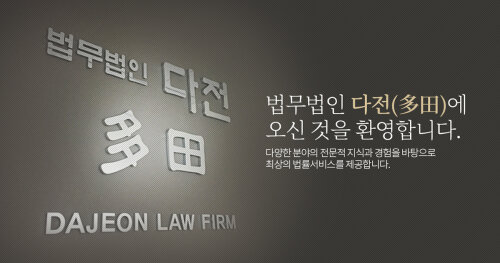Best Debt & Collection Lawyers in South Korea
Share your needs with us, get contacted by law firms.
Free. Takes 2 min.
Or refine your search by selecting a city:
List of the best lawyers in South Korea
About Debt & Collection Law in South Korea
Debt and collection law in South Korea is engineered to balance the interests of creditors and debtors, establishing a legal framework that facilitates the recovery of debts while protecting debtors from unfair practices. The regulations are governed by civil law principles and influenced by the Fair Collection Practices Act, designed to prevent harassment and abuses by collection agencies. This framework is essential for resolving disputes between parties in a fair and orderly manner.
Why You May Need a Lawyer
There are several scenarios where individuals or businesses may require legal advice in the field of debt and collection in South Korea:
- Debt Disputes: If there's a disagreement regarding the repayment amount or terms, legal intervention may be necessary to resolve the conflict.
- Harassment by Creditors: If a debtor is facing abusive or unlawful collection practices, a lawyer can help stop these actions and seek remedies.
- Debt Settlement: Negotiating repayment plans that are manageable based on a debtor's financial circumstances may require legal guidance.
- Bankruptcy Proceedings: In cases of insolvency, lawyers can assist in navigating bankruptcy procedures and protect a debtor's rights.
- Contract Review: Review of loan agreements to ensure that the terms are fair and legal is often advised.
- Asset Protection: Legal advice can help protect assets from being unjustly seized in the debt collection process.
Local Laws Overview
The primary legal instruments governing debt and collection in South Korea include the Civil Code, the Civil Execution Act, and additional regulations such as the Act on Collection of Debts by Financial Institutions:
- Civil Code: Establishes the fundamental rules for the repayment of debts and the obligations of both creditors and debtors.
- Civil Execution Act: Provides legal procedures for enforcing court judgments regarding debt recovery.
- Act on Collection of Debits by Financial Institutions: Limits the methods creditors can use when collecting debts, aiming to protect debtors from unfair practices.
- Bankruptcy Law: Offers legal protection to insolvent individuals or entities, providing mechanisms for debt resolution.
- Consumer Protection Laws: These laws are instrumental in shielding consumers from fraudulent or oppressive debt collection practices.
Frequently Asked Questions
What legal options do I have if I'm being harassed by a debt collector?
You can file a complaint with the Financial Supervisory Service or take legal action against the collector. Consulting a lawyer for personalized advice and relief is advisable.
Can a creditor seize my salary in South Korea?
Under certain conditions, creditors may seek a garnishment order through the courts to legally claim a portion of your wages, but there are limitations to protect minimum living expenses.
What is the statute of limitations for debt collection in South Korea?
Generally, the statute of limitations for consumer debts is five years. However, this may vary based on the type and origin of the debt.
Is bankruptcy a viable option for managing overwhelming debt?
Yes, bankruptcy can provide relief from insurmountable debts. It is vital to consult a lawyer to understand the implications and alternatives before proceeding.
What should I do if I disagree with a debt claimed by a collector?
You should request detailed account documentation from the collector and seek legal advice to challenge the debt if discrepancies are found.
Can I negotiate the terms of my debt repayment?
Yes, many creditors are willing to negotiate alternative payment plans to recover outstanding debts, often facilitated effectively by a lawyer.
How do I ensure a debt collection agency acts legally?
Familiarize yourself with your rights under the Act on Collection of Debts by Financial Institutions and seek legal aid if you believe these rights are violated.
Can a foreigner face debt collection in South Korea?
Yes, foreigners with debts in South Korea may be subject to the same collection processes as locals, including legal actions and court orders.
What are my rights if my account is mistakenly sent for collection?
You must act promptly to dispute the erroneous debt claim, providing any applicable proof of payment or non-liability, ideally with the assistance of legal counsel.
Are there any credit agreements that can be challenged post-signing?
If you believe the contract contained unfair or illegal terms, it might be contestable in court, especially if you were subjected to undue pressure or misrepresentation when signing.
Additional Resources
For comprehensive advice and help regarding debt and collection, consider reaching out to the following resources:
- Financial Supervisory Service (FSS): For complaints against financial institutions.
- Korea Legal Aid Corporation: Offers legal advice and representation for those in financial distress.
- Korean Bar Association: Can help you find a qualified lawyer specializing in debt and collection issues.
- Consumer Protection Board: Protects consumer rights and provides guidance on dealing with unfair practices.
Next Steps
If you find yourself requiring legal assistance with debt and collection issues in South Korea, consider taking the following steps:
- Consult a Lawyer: Begin by consulting with a licensed attorney who specializes in debt and collection law to understand your rights and options.
- Document Everything: Keep detailed records of all communications with creditors or collectors and any payments made.
- Research Your Rights: Familiarize yourself with relevant local laws to be better informed about legal processes and protections.
- Seek Mediation: Attempt to negotiate or mediate a resolution with creditors, if possible, to avoid court procedures.
Lawzana helps you find the best lawyers and law firms in South Korea through a curated and pre-screened list of qualified legal professionals. Our platform offers rankings and detailed profiles of attorneys and law firms, allowing you to compare based on practice areas, including Debt & Collection, experience, and client feedback.
Each profile includes a description of the firm's areas of practice, client reviews, team members and partners, year of establishment, spoken languages, office locations, contact information, social media presence, and any published articles or resources. Most firms on our platform speak English and are experienced in both local and international legal matters.
Get a quote from top-rated law firms in South Korea — quickly, securely, and without unnecessary hassle.
Disclaimer:
The information provided on this page is for general informational purposes only and does not constitute legal advice. While we strive to ensure the accuracy and relevance of the content, legal information may change over time, and interpretations of the law can vary. You should always consult with a qualified legal professional for advice specific to your situation.
We disclaim all liability for actions taken or not taken based on the content of this page. If you believe any information is incorrect or outdated, please contact us, and we will review and update it where appropriate.
Browse debt & collection law firms by city in South Korea
Refine your search by selecting a city.
















